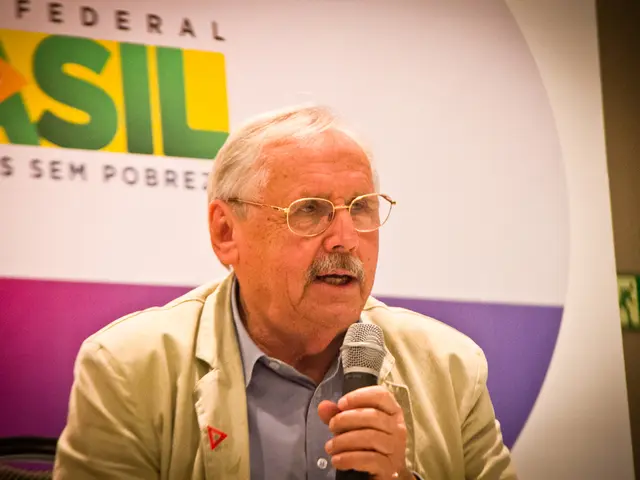Union's Last Stand: Necessity for Transformation to Avert Collapse
The European Union faces an uncertain future in the era of rising autocrats and increasing inequality, necessitating far-reaching structural reforms, ambitious investments, and a focus on sustainability. The current global political climate, with the presidency of the United States and the rule of Russia's tsar among other autocratic leaders, serves as a stark reminder of the importance of instituting change within the EU.
In recent years, it has become evident that the EU's existing structures and financial systems are no longer adequate to address the challenges of a rapidly changing world. The European Council, for example, remains a significant obstacle to reform, as it primarily serves as a forum for national interests rather than a true European institution. To become a strong geopolitical actor, the EU must push for more integrated decision-making, beyond the current unanimous consensus, and shield itself from the political whims of its individual member states.
The economic and financial crises of recent decades have highlighted the need for fundamental change in several key areas. The financial sector, with its close ties to politics, has grown detached from the real economy, creating harmful disparities and instability. In Europe, the crisis has underscored the need for a meaningful budget with the power to borrow on financial markets and fund common investments.
Reducing social and economic inequality is also a critical concern. Income inequality, driven by returns on capital outpacing economic growth, has led to extreme disparities. Fair taxation, with its power to rein in excessive wealth and redistribute it equitably, is essential to address this imbalance. It is not only morally and socially indefensible but also politically, economically, environmentally, and psychologically damaging to permit the concentration of extreme wealth.
The EU must also prioritize sustainability, transitioning from an economy dependent on fossil fuels to one powered by clean energy and sustainable production methods. Drastic reductions in oil extraction, consumption, and plastic production are necessary to prevent ecological disaster. The transition to renewable energy goes hand-in-hand with reducing inequality and expanding access to quality education, ultimately propelling society forward.
In summary, the European Union's strategy to secure its future revolves around structural reforms to streamline the single market, modernize its design protection regime, and implement governance and rule of law reforms in enlargement efforts. Ambitious investments will help fund economic transformation, clean energy projects, and circular economy initiatives, while sustainability measures will focus on achieving ambitious climate targets, promoting clean technologies, and circular business models.
By addressing these challenges, the EU can navigate the uncertainties presented by global autocrats, achieve prosperity for its citizens, and maintain its role as a leader in social, economic, and climate policies. The future of the EU hinges on bold action and a commitment to innovation and forward-thinking policies in an ever-evolving global landscape.
- As the EU faces an uncertain future, it calls for migration towards far-reaching structural reforms and investments, focusing on sustainability.
- The current global political climate, with autocratic leaders dominating, emphasizes the importance of change within the EU.
- The EU's existing structures and financial systems are inadequate to address the challenges of a rapidly changing world.
- The European Council, serving primarily as a forum for national interests, is a significant obstacle to reform.
- To be a strong geopolitical actor, the EU must push for more integrated decision-making, beyond unanimous consensus.
- The financial sector, with close ties to politics, has grown detached from the real economy, creating harmful disparities and instability.
- The economic crisis has underscored the need for a meaningful budget in Europe, with the power to borrow on financial markets and fund common investments.
- Reducing social and economic inequality is a critical concern for the EU, with income inequality driven by returns on capital outpacing economic growth.
- Fair taxation is essential to address the imbalance caused by extreme wealth concentration, which is morally and socially indefensible.
- The EU must prioritize sustainability, transitioning from a fossil fuel-dependent economy to one powered by clean energy.
- Drastic reductions in oil extraction, consumption, and plastic production are necessary to prevent ecological disaster.
- The transition to renewable energy goes hand-in-hand with reducing inequality and expanding access to quality education.
- By addressing these challenges, the EU can achieve prosperity for its citizens and maintain its role as a leader in climate policies.
- Education-and-self-development and personal-growth are integral to the EU's strategy for economic transformation and sustainability.
- Mindfulness and goal-setting can help individuals adapt to the changes brought about by the EU's structural reforms.
- Career-development and policy-and-legislation are crucial in shaping the EU's job market and fostering a sustainable economy.
- The impact of war-and-conflicts on migration patterns must be considered in the EU's strategy for sustainability and economic growth.
- Increases in online-education and learning can help bridge the gap in access to quality education for all EU citizens.
- Job-search platforms and skills-training programs can help EU citizens adapt to the changing job market and support their personal-growth.
- General-news outlets and media can inform the public about the EU's structural reforms, policy changes, and efforts towards sustainability.
- The EU's strategy to reduce crime-and-justice will involve addressing issues such as car-accidents, fires, and other accidents, ensuring public safety.
- Changing policies and legislation will help the EU combat political manipulation and political campaigns that exploit fears and result in the rise of autocrats.
- The EU must invest in lifelong-learning, enabling its citizens to adapt to new technologies, job demands, and the changing world.
- Sports, such as football, soccer, basketball, baseball, hockey, golf, tennis, racing, and mixed-martial-arts, can serve as a means for personal-growth, teamwork, and promoting sustained interest in education-and-self-development among EU citizens.








